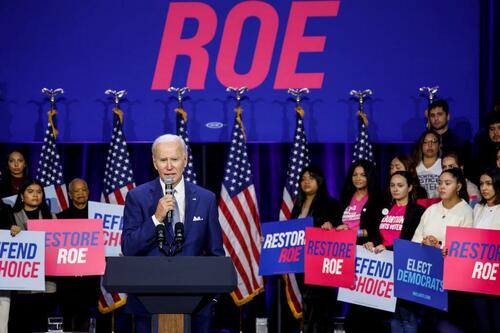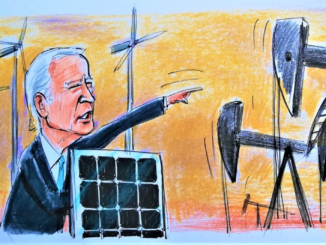
In what was billed as a major address yesterday by the White House, President Joe Biden declared that, if the Democrats prevail in the midterm elections, “here’s the promise I make to you and the American people: The first bill I will send to the Congress will be to codify Roe v. Wade. And when Congress passes it, I’ll sign it in January, 50 years after Roe was first decided the law of the land.”
As previously discussed, the bill being referenced by the President and Democrats is not a codification of Roe v. Wade, but rather a significant expansion of the precedent. Biden also returned to his claim that the right can be based entirely on the Ninth Amendment.
The Women’s Health Protection Act (WHPA) is routinely described in the media as a “codification of Roe,” repeating the false claim by the White House and many Democratic sponsors. It is in fact what many pro-choice advocates have always wanted Roe to be but have been unsuccessful in establishing through the court system.
The Democrats could have simply sought the codification of Roe but instead loaded the WHPA with a wishlist of pro-choice provisions. The WHPA would dramatically expand Roe and its successor case, Planned Parenthood of Southeastern Pennsylvania v. Casey. It seeks to accomplish legislatively what could not be accomplished judicially for decades.
The bill declares the “violent legacy” of “restrictions on reproductive health, including abortion … [that] perpetuate systems of oppression, lack of bodily autonomy, white supremacy, and anti-Black racism.”
It would wipe away the precedent following Roe where states did impose legislative conditions and limitations on abortions within the constitutional framework laid out by the Court. Since 1973, states have used that precedent to enact hundreds of laws on abortions.
There are legitimate objections to some of these laws. However, if the President and Congress are going to preempt state laws, they should be honest with voters that this an expansion (rather than a codification) of the status quo of Roe.
The precedent under Roe and its successor cases bar states from imposing an undue burden on the right to an abortion, or laws that have “the purpose or effect of placing a substantial obstacle in the path of a woman seeking an abortion of a nonviable fetus.” That can be stated in a couple lines. But the WHPA would superficially track constitutional language while adopting other undefined or sweeping terms.
It bars any limitation or requirement that “expressly, effectively, implicitly, or as implemented singles out” and “impedes access to” abortion. Any state law would need to show — by clear and convincing evidence — that it “significantly advances the safety of abortion services or the health of patients,” and that such safety “cannot be advanced by a less restrictive alternative measure.”
Conversely, a law can “impede” abortion rights under seven broad standards — including any conditions that are “reasonably likely to directly or indirectly increase the cost of providing … or obtaining abortion services (including costs associated with travel, childcare, or time off work),” that “deters some patients.” It also impedes the right if it causes “a trip to the offices of a health care provider that would not otherwise be required.”
Under the WHPA, no law could countermand a health-care provider who believes “continuation of the pregnancy would pose a risk to the pregnant patient’s life or health.” The term “health” is not defined and such terms are required to be “liberally construed” under the law. The law could be read as preempting certain late term abortion laws and other limits.
The WHPA could make it more difficult to establish waiting periods under current state laws. Laws requiring the involvement of licensed physicians could be struck down, too, since the key “health care provider” definition includes a “certified nurse-midwife, nurse practitioner, and physician assistant.”
Again, these are important issues that are worthy of debate. Indeed, they are the types of definitions, procedures and standards that have resulted in different approaches among the states under the current post-Roe precedent — laws that could be preempted under the WHPA.
President Biden also returned to the claim that the Constitution’s Ninth Amendment contains a “right to privacy.”
He explained “There’s a thing called the Ninth Amendment that says there’s a right to privacy. That’s how it was interpreted back then.”
The Court has expressly rejected this rationale and any law based on this claim would likely face the same result before the current Court.
The Ninth Amendment of the U.S. Constitution states “the enumeration in the Constitution, of certain rights, shall not be construed to deny or disparage others retained by the people.”
Biden previously made the same claim during a NATO press conference on June 30. He added:
“I have written, way back, a number of law review articles about the Ninth Amendment and the – and the Fourteenth Amendment and why that privacy is considered as part of a constitutional guarantee.”
Even the Washington Post declared that claim to be false. It awarded two “Pinocchios” though it is not clear what it takes to get more “Pinocchios” in this circumstance.
Nevertheless, the Post tried to be as gentle as possible, noting that “as we’ve already documented, the president tends to embellish the factual record of his past at times.” This includes his claim of being arrested during civil rights protests and also that he was arrested in his effort to see Nelson Mandela.
On this occasion, the Post found no such law review articles written by Biden, as repeatedly claimed in public.
As for the Ninth Amendment, it was meant by James Madison as a way to assure anti-Federalists and others that, by listing certain rights, the Bill of Rights was not confining rights to those listed.
However, the Court has rejected the type of argument repeatedly eluded to by the President. Such rights must be established as deeply rooted in our history. In the recent Dodd decision, the Court expressly rejected abortion as one of those rights.



